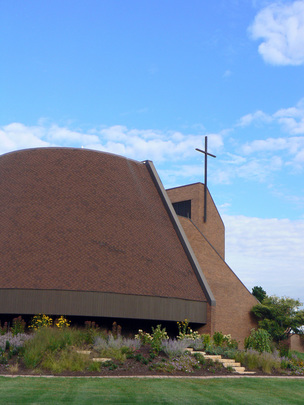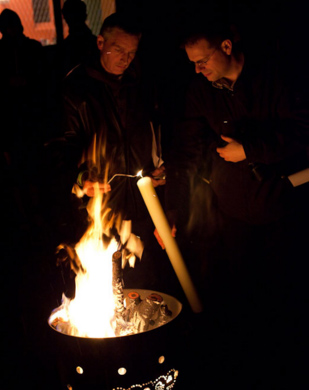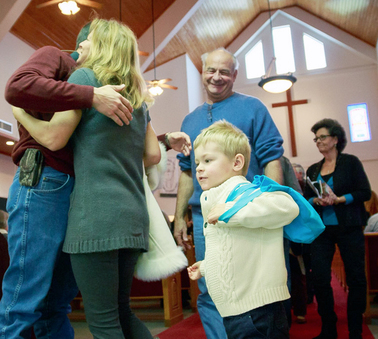 At a special service on November 23rd, 1980 our building was dedicated to God “As a place where the lambs of the flock of Christ may be fed, where little children may increase in wisdom and favor with God and man, where the young may be taught to remember their Creator in the days of their youth, where a generation may grow up fit for citizenship on earth and in heaven with Thee.” Biblically speaking a symbolic generation is 40 years. Israel wandered 40 years so that the generation that left Egypt would not be the same generation that entered the Promised Land. So if we apply that symbolism to St. Paul’s we have to say that this building has almost served the purpose for which it was dedicated, to be a place “where a generation may grow up…” If you were born the day this building was dedicated, then you are almost 36 years old right now, and hopefully through our ministry you have grown in favor with God and man and been made fit for citizenship in the world and in the kingdom of God. And hopefully that means that you desire to pass on the Gospel to future generations just like the 36-year-olds around here back in 1980 did. We are the people to whom this building was dedicated. We are the inheritors, the receivers, the fulfillment of all the prayers and the hard work, the vision those people had in mind. Time marches on. Today, with those 40 years almost up, we have several options. I suppose we could shut down the ministry of St. Paul’s altogether and say our work is done. But no Christian would seriously consider not feeding the next generation with the Gospel. We could relocate St. Paul’s somewhere else and build a new building like the people a generation ago did. That hardly seems like a desirable idea, but it is possible, I guess. We can keep milking the generosity and hard work of our forebears for as many more years as the building they built for us holds out without our doing anything and then shut everything down, but that would not only be ungrateful of us but extremely bad stewardship. Or we can step up to the plate like they did and make a decision with a view toward 40 years from now in mind. The heating units that were brand spanking new on Nov. 23, 1980 are also almost 36 years old. Buildings, wiring, plumbing, furnaces—they all age. You have to constantly maintain them just to keep them the same as they were. The blessings of a nearly 70,000 square foot facility come with responsibilities. We need to replace the HVAC system in the school with newer, more efficient, and A/C capable units if anyone is going to be nurtured on the Gospel here 40 years from now. And not only do buildings age, but standards change. Back in 1980 the houses around our church were all the very latest architecture. Today we are far more conscious of the needs of the elderly and most people think tri-level homes have too many stairs for some people to live in comfortably. If our subdivision were being built today the houses would look very different. What is true of home architecture is true of institutions. Not only have we tried to reduce steps, we’ve tried to facilitate easily getting dropped off and picked up. Newer buildings, especially those that serve the elderly, tend to have a covered drop off/pick up area where people who move slowly can get from the car to the building without being out in the rain and snow. In 2017, the 500th anniversary of the Reformation, we hope to begin the process of rededicating St. Paul’s Lutheran Church and School. The Parish Planning Council has already begun looking into ways to bring this about. It will require a lot of planning, a lot of dedication of time, talents and treasure, and a vision of how we will hand off this ministry to the next generation. This rededication will hopefully address the aging of the building and the changing of the standards in our society around us, and will also take up ideas and suggestions that come from anyone in the congregation, so be sure to attend the meetings, read the newsletters, and give feedback to your deacon or to the staff as things progress. What we want to be able to do here at St. Paul’s is join in the prayers of those who gave us this place and at the dedication of it said, “O Lord, the God of our fathers, by whose works of love in past generations You have richly blessed us, grant that our works may prove a blessing to our children in generations still to come.”
1 Comment
 Some of your best memories of church services have probably been services that weren’t the normal Sunday morning service. Singing on Christmas Eve (even at the midnight services), getting up while it was still dark for the “sunrise services” in the wee hours of Easter morning, hearing the words “Remember that you are dust and to dust you shall return” as the ashes are applied on Ash Wednesday, listening in the darkness as the psalm is chanted and the altar stripped at the end of Maundy Thursday services—these tend to be very memorable services that aren’t at the normal time of weekly worship. It gets harder and harder for these special services to compete with our convenience-dominated culture. People don’t want to stay up late, get up early, go out of their way, or otherwise change their schedule, much less do so with sleepy children. So in most (not all) churches, the late night Christmas Eve service is lightly attended if even still offered. Same with Christmas Day. At Easter the “sunrise service” has been moved to a more reasonable hour and is not packed like the later services. And special services for high feast days like Epiphany, Ascension, Reformation and All Saints very often just get moved to the closest Sunday so they can be celebrated without inconveniencing anyone. So it might come as a surprise to us that for many centuries the most important church service of the year was the Easter Vigil, which, as the name implies, lasted hours and hours through the night and ended with the Easter proclamation and communion at dawn. This was (and is in many places) the service in which all the adult catechumens (converts to Christianity who had been taught the faith over the course of the year) were baptized, received into membership, and took their first communion. Most places do not really keep vigil through the night but celebrate the service either Saturday night or Easter Sunday very early. This year were are going to have an Easter Vigil service here at St. Paul’s at 8:00 p.m. on the Saturday night before Easter Sunday. I encourage you to attend because it is one of those special services that make an impression. No, it won’t go all night. In fact, it will only be the first half of the service, and the 7:00 a.m. Easter service will complete it. The service begins outside with the lighting of a paschal candle (“Paschal” is from the old word for Passover and in church usage just means “Easter-related” because at Easter we celebrate that we have passed over from death to life) from a small bonfire, which in our case will be in the courtyard. The worshippers light their own candles from the paschal candle and go into the darkened sanctuary, with their candlelight symbolizing faith in God’s promises in a fallen world. Various Old Testament readings and musical responses recount God’s faithfulness through all of human history. We then remember our own baptism and crossing over from dark to light, from death to life in the victory of Jesus Christ over sin, death, and hell. Normally the service goes straight into the Easter proclamation and communion service, but we are going to leave the church in silence and resume Easter morning with the great celebration. Please consider changing up your Easter weekend routine to join us for this very solemn and meaningful service. Most people who do it once find that it quickly becomes one of their favorite services of the year.  Church attendance nationally is down, and not just by a little bit. It is as though in the last fifteen years our culture has just collectively decided that going to church on Sunday is not a "thing" anymore. And what is true for our nation is certainly true for us here at St. Paul’s. In 2001 our average weekly attendance was 822. In 2015 the average was 463. But trends are not fate. While our societal trends are not really in our control except to the degree we participate in them, we can still focus on what we can influence, which starts with ourselves. Most of the drop in attendance here at St. Paul’s is not because people have quit church altogether but because they have stopped attending regularly. Many people who used to be here every week now come once or twice a month. People who used to come every other week now come a few times a year. We have stopped taking it for granted that our week ought to begin with first things first by attending church and starting thinking of it more like a commodity, something to do when we really feel a need for it or when it is convenient. What was formerly a "given" has turned into an option. The New Testament tells Christians not to stop meeting together. Apparently some of the earliest Christians had already begun skipping regular worship under the mistaken impression that “going to church” didn’t matter for them as long as they had faith. But that misses most of the point about attendance. The key word is “together,” which means that you not only benefit from the presence of other people as you sing, pray, and hear the Word, but your presence also benefits them. When you decide to skip church, you aren’t only deciding for yourself that you can do without Word and Sacrament ministry and the mutual consolation of the brethren for a week. You’re also unilaterally declaring that everyone else can do just fine without you there. And you are wrong. The indelible impression on young minds of seeing widows and newlyweds, trouble-makers and respectable folk, black and white, rich and poor, young and old all singing and praying together can never happen if most of those people don’t show up. When you stay home because your toddler is such a hassle, you aren’t only making your morning more manageable. You’re also declaring that the 90 year old who sometimes sits behind you shall not have your toddler to smile at and thereby have his faith in the future of God’s promises reinforced. When you as a twenty-something stay home from church because Sunday is the day you sleep in and you don’t feel like you get much out of church anyway because you already learned it all in Sunday school, you’re not only getting extra sleep for yourself. You’re also depriving some other twentysomething visitor, who never did learn it all in Sunday school, and who is nervous and uncomfortable in church, of the assurance your presence might have given that this strange place is a place for them, too. When you as a middle-aged man skip church, you’re not only (mistakenly) reasoning that you have more important places to be, but you are robbing some fatherless teenage boy whose mom made him go to church that morning of the example your presence in worship might have given. When you stay home because you’re too embarrassed to use the wheelchair, you are robbing your church family of the comfort of seeing that growing old gracefully is possible, and that should the day ever come from them to be a wheelchair, their church would welcome them as it welcomes you. No matter who you are or what your situation is, when it says in Hebrews not to stop meeting together, God isn’t just telling you that you will be blessed if you go to church. He is also telling you are a blessing to the others there whether you know it or not. Don’t selfishly rob everyone else of the blessing God wants to give them through your voice, your problems, your prayers, and your presence with them in worship. |
AuthorRev. Peter Speckhard, Senior Pastor at St. Paul's Ev. Lutheran Church, Munster, Indiana Archives
February 2021
Topics
All
|


 RSS Feed
RSS Feed